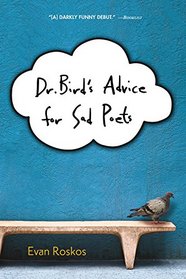Summary:
James Whitman has depression, not just sad for a few days teenager drama, but the actual disease. His parents, who don't believe in therapy, have kicked his sister Jorie out of the house and have no interest in letting her come back. As James discusses this with Dr. Bird (an imaginary pigeon who does talk back), he decides that he is going to get his sister back into school and the house. In the process, he memorizes poetry (all Walt Whitman), hugs tress (literal), joins a writing group, and attempts to deal with the realities of high school (including drinking and drug use).
My thoughts:
As a teacher, I loved how Rosko included Walt Whitman into the plot without it ever feeling planted. The poetry flows right into the story and doesn't feel like a literature lesson. There are plot lines that also strongly parallel Whitman's poetry which is fun to examine. There is enough humor throughout the book that the reader does not get depressed as well. I know that a lot of books that focus on this subject can make the reader just as sad as the character and then it's hard to pick up the book to finish it; however, Rosko manages to mix the reality of depression with highlights of goofiness.
(SPOILER)
James does eventually go to a therapist, that he pays for, and there is a change in his character towards the end of the book. It is a gradual change and not a "poof" everything's fixed. As I hit the ending I felt happy that progress was made, but not that the story had ended. I felt close enough to James to realize that this book is only a small section of his life. It will continue to live on, even if Rosko doesn't write about him again.
James Whitman has depression, not just sad for a few days teenager drama, but the actual disease. His parents, who don't believe in therapy, have kicked his sister Jorie out of the house and have no interest in letting her come back. As James discusses this with Dr. Bird (an imaginary pigeon who does talk back), he decides that he is going to get his sister back into school and the house. In the process, he memorizes poetry (all Walt Whitman), hugs tress (literal), joins a writing group, and attempts to deal with the realities of high school (including drinking and drug use).
My thoughts:
As a teacher, I loved how Rosko included Walt Whitman into the plot without it ever feeling planted. The poetry flows right into the story and doesn't feel like a literature lesson. There are plot lines that also strongly parallel Whitman's poetry which is fun to examine. There is enough humor throughout the book that the reader does not get depressed as well. I know that a lot of books that focus on this subject can make the reader just as sad as the character and then it's hard to pick up the book to finish it; however, Rosko manages to mix the reality of depression with highlights of goofiness.
(SPOILER)
James does eventually go to a therapist, that he pays for, and there is a change in his character towards the end of the book. It is a gradual change and not a "poof" everything's fixed. As I hit the ending I felt happy that progress was made, but not that the story had ended. I felt close enough to James to realize that this book is only a small section of his life. It will continue to live on, even if Rosko doesn't write about him again.




